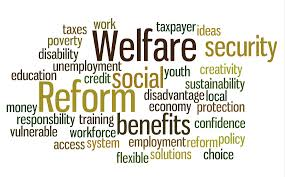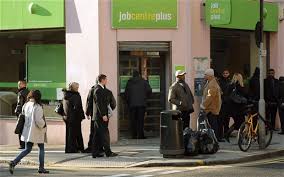 Countless Governments have tried and failed to roll back the benefits system against those that can and wont work. At the outset, let me be clear; I believe in a welfare system that provides a safety net for those that need it and protects the most vulnerable in our society.
Countless Governments have tried and failed to roll back the benefits system against those that can and wont work. At the outset, let me be clear; I believe in a welfare system that provides a safety net for those that need it and protects the most vulnerable in our society.
Failure of the Labour years.
 During the early years, Labour sought to reform benefits, but when they encountered resistance to change they backed away.
During the early years, Labour sought to reform benefits, but when they encountered resistance to change they backed away.
Not only this, they brought forward an approach that had the perverse effect of punishing work. For example – hardworking taxpayers could lose over £9 of every £10 extra they earned. Under Labour the benefit system became so  complicated that for many there was no point in working more because they would lose more in benefits than they would earn in work.
complicated that for many there was no point in working more because they would lose more in benefits than they would earn in work.
There efforts also failed especially the young; Labour’s much vaunted and expensive ‘Future Jobs Fund’ saw nearly half of participants back on benefits as soon as the six months of their placement were due for renewal.
They also trapped many in low wages by letting the tax credit bill get out of control. Tax credit spending increased by an astonishing 340 per cent between 1997/98 and 2010, while at the same time average earnings increased by 30 per cent. Even Alastair Darling admitted that Tax Credits were ‘subsidising lower wages in a way that was never intended’.
Reform by the Conservatives
 The mission, started by the Rt Hon Iain Duncan Smith MP, was to make work pay and lift many out of welfare dependency altogether. He understood that the value of work goes far beyond the economic benefits – it significantly affects health and wellbeing.
The mission, started by the Rt Hon Iain Duncan Smith MP, was to make work pay and lift many out of welfare dependency altogether. He understood that the value of work goes far beyond the economic benefits – it significantly affects health and wellbeing.
As part of the broader economic strategy, has seen employment rise by 2.8 million since  2010. That means more people with the dignity of a job, security of a regular pay packet, and more people able to support their families.
2010. That means more people with the dignity of a job, security of a regular pay packet, and more people able to support their families.
The flagship policy of ‘Universal Credit’ is a crucial reform to our benefits system designed to make sure work always pays. From this month the Government will reduce the  Universal Credit taper rate from 65 per cent to 63 per cent – effectively a tax cut for those in work on low incomes. This will increase the incentive to work and progress for 3 million households, and means that a couple with two children receiving the housing element of Universal Credit, where one parent earns £30,000 a year, would benefit by around £425 per year.
Universal Credit taper rate from 65 per cent to 63 per cent – effectively a tax cut for those in work on low incomes. This will increase the incentive to work and progress for 3 million households, and means that a couple with two children receiving the housing element of Universal Credit, where one parent earns £30,000 a year, would benefit by around £425 per year.
During the Labour years, the starting rate for tax hardly moved. Raising the tax-free personal allowance has done more to help ordinary working people than almost anything else. These change mean for example that someone with a salary of £15,000 pays just £800 a year in tax compared to £1,705 in 2010. It single handedly took four million people out of income tax altogether. The personal allowance will raise even further to £12,500.
One of the comments that I heard frequently on the doorstep under the Labour years was hard working families seeing families on benefits being better off. This was profoundly wrong. Introducing the cap on the overall amount an out of work household can get in benefits ensured people cannot claim more in benefits than most earn in work. The benefit cap is being reduced further from £26,000 to £23,000 in London, and £20,000 in the rest of the country.
Benefit levels for a time rose faster than average wages. That is why the Government capped the increase to 1 per cent to match public sector pay. This will save billions and rewards work by ensuring benefits don’t rise faster than wages.
Supporting the vulnerable and pensioners
For those that cannot work, it was right to exempt those with serious and chronic conditions from reassessments. This will remove unnecessary stress and bureaucracy for the most vulnerable in society.
 On pensions the triple lock was introduced. This makes sure the basic State Pension goes up by whichever is highest of inflation, wages or 2.5 per cent. Last year the basic State Pension saw the biggest real terms increase since 2001, meaning someone on a full basic State Pension is around £570 more a year better off than if it had been uprated by average earnings, and received £1,125 more per year overall than in 2010-11.
On pensions the triple lock was introduced. This makes sure the basic State Pension goes up by whichever is highest of inflation, wages or 2.5 per cent. Last year the basic State Pension saw the biggest real terms increase since 2001, meaning someone on a full basic State Pension is around £570 more a year better off than if it had been uprated by average earnings, and received £1,125 more per year overall than in 2010-11.
For those of working age automatic enrolment in pensions supports people to save for their retirement. This requires all employers to automatically enrol eligible workers in a good quality workplace pension scheme. The number of people saving into workplace pensions has increased by 4.4 million since 2012, and research by the IFS has shown that, between 2012 and 2015, 95 per cent of the rise in private sector membership was the result of automatic enrolment, and that these changes disproportionately benefit low earners. In addition, around 2 million people will benefit from a new market-leading savings bond announced by the Chancellor at the Autumn Statement.
Whilst the path to benefit reform will never be an easy one, with care taken to protect the vulnerable and those most in need, the Government is going in the right direction.